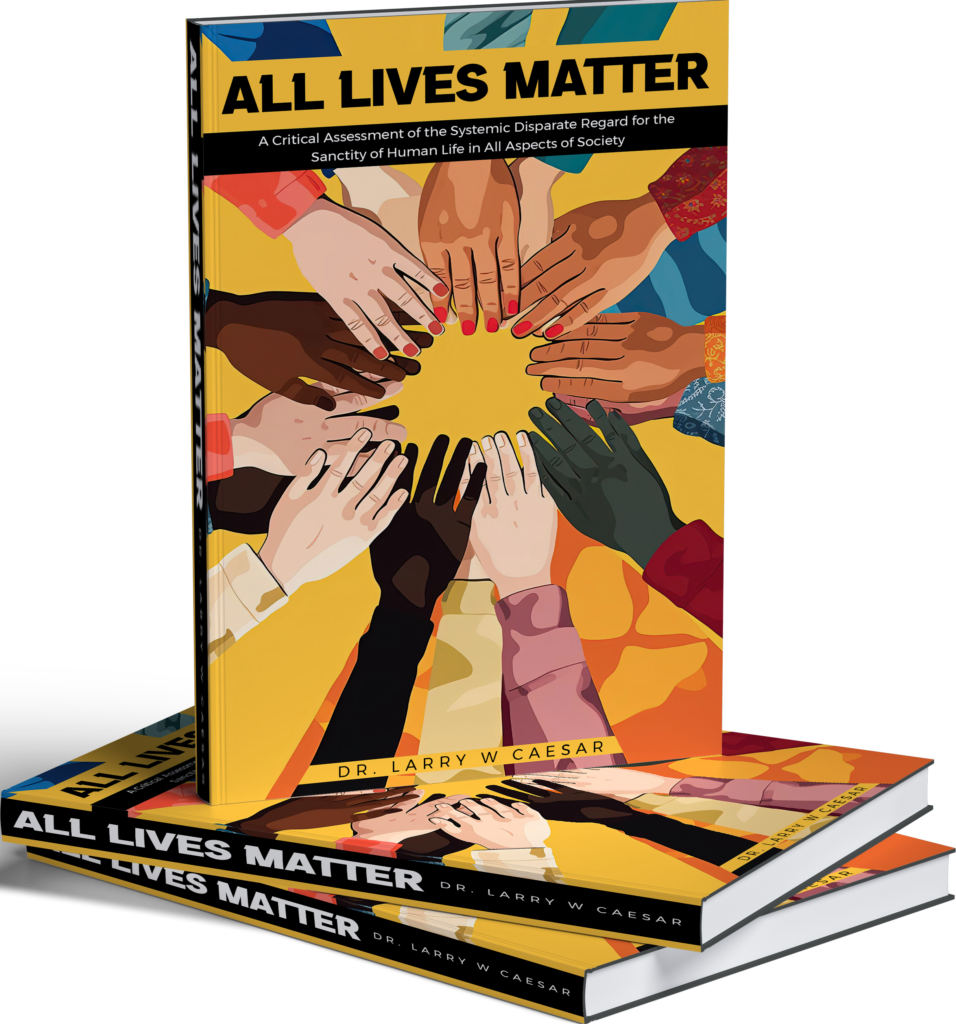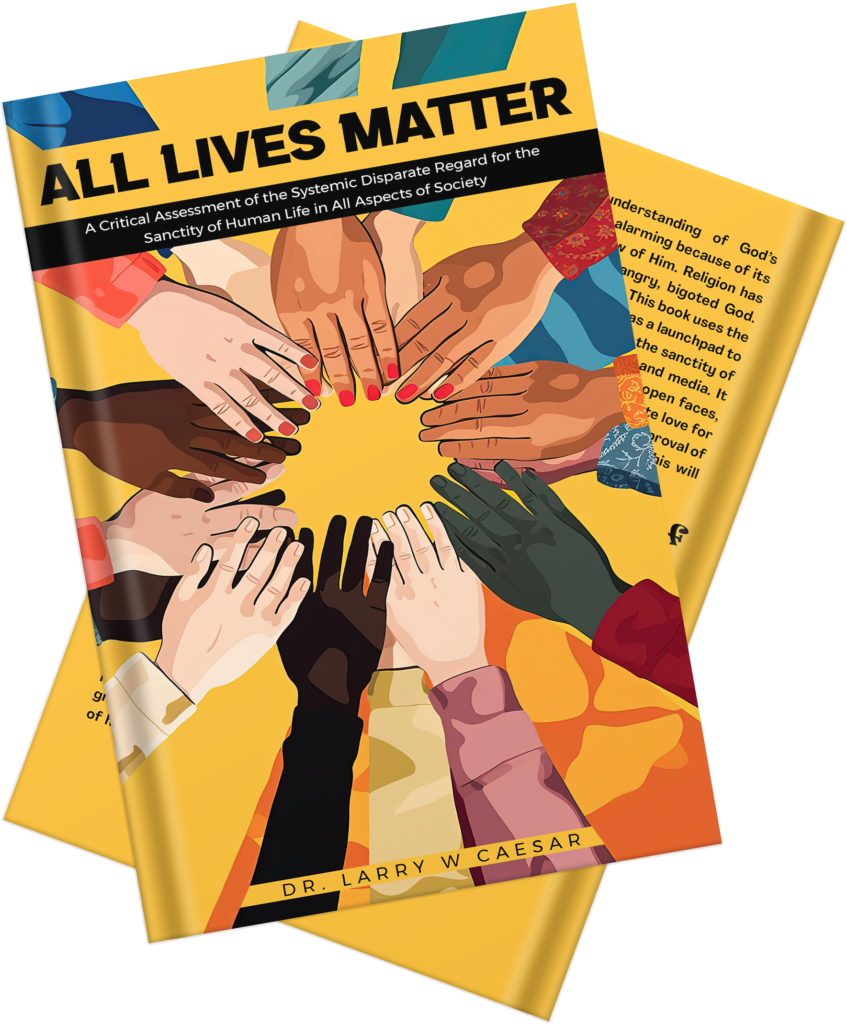Art and Culture in Reconciliation: Bridging Divides
Transforming Perspectives: Art: Through visual arts, music, dance, and literature, we…
In this newly published book, “All Lives Matters,” Dr. Larry W Caesar dares to address a fundamental and pervasive societal problem. He shines a light on the misperception of God’s true nature that is reflected in our perception of ourselves and others. This book argues that we have created societies that reflect our false belief that God neither loves unconditionally nor values each person equally.


















Dr. Larry Winston Caesar is a man of diverse talents and experiences. Originally from Trinidad and Tobago, he immigrated to the US in 1999 and now resides in Houston, Texas. With a career of nearly 16 years as an outpatient pediatrician, he is board-certified in Pediatrics and Integrative medicine. His diverse background also includes training in Functional medicine and health and life coaching, adding a unique perspective to his practice.
Larry is also an ordained minister. He is one of the founding board members of a religious non-profit founded in 2017. He is involved in that organization as a musician and a teacher. Larry is a poet and songwriter. He has also dabbled in entrepreneurship.
“All Lives Matter” is now available in ebook, paperback, and hardcover formats. You can purchase and download the ebook from this website or buy a Kindle edition, paperback, or hardcover from Amazon. It will also be available soon at Apple Books, Barnes & Noble, and Lulu. The audiobook version will be available soon as well.

introduces the idea of formative subconscious programming on behavior and its longstanding impact that continues into adulthood. It is discussed in the context of Law enforcement personnel being susceptible to unconscious systemic programming, which can influence their behavior, especially in high-pressure situations where actions are instinctive. This chapter claims personal crises and or training are necessary to challenge and change deeply embedded subconscious actions and reactions. This chapter intimates that systemic disregard for the sanctity of human life is part of societal formative programming and promises further exploration in upcoming chapters.
discusses the concept of the sanctity of human life and its relevance to ethical and political debates. It explores the definition of the sanctity of life and its universality. The section also addresses the role of moral conviction in shaping perceptions and behavior, particularly in law enforcement. It raises thought-provoking questions about the value of life at different stages and in different circumstances. The section concludes by examining the relationship between the sanctity of human life and belief in God.
uses Mark Twain’s War Prayer to explore the claimed disregard for the sanctity of human life in war. It highlights the United States’ significant international military presence, indicating an obsession with war. The discussed negative consequences of war include bilateral loss of life from warfare itself, high PTSD, divorce and suicide rates among veterans, military sexual trauma, and unethical experiments on soldiers. It ends with the human cost of post-9/11 wars, which includes millions of deaths, injuries, and displacement of civilians.
examines the hypocrisy of religion regarding the value of human life. It discusses the attempted manipulation of God, ignorance of His true nature, as well as the historical use of religion to justify wars, slavery, and racism. This chapter also explores the biased support for the state of Israel. It also questions the bias in the dominant Christian understanding of eternal destiny and its impact on societal morality
discusses the significant role of media, including film, music, television, and social media, has in shaping society and culture, including the impact on thinking, behavior, and values. It is valued at over $2.2 trillion globally and affects our thinking, behavior, and values, impacting dietary, clothing, and spending choices. Social media can create unrealistic impressions, leading to depression and even suicide. Violent media may increase aggression, and advertising significantly influences behavior. Rap music plays a substantial role in shaping social reality, and there is cause for concern about nefarious motives for its intentional negative messaging
addresses the author’s concern about the motives of the US medical system, especially its acceptance that a certain percentage of treated patients will have adverse effects or even die. It delves into the global impact and societal perception of abortion, as well as the limitations of Western Medicine in addressing chronic diseases. The chapter also compares the training and accountability of doctors and police officers. It discusses the controversy surrounding COVID-19 vaccines, including the lack of long-term safety data and the dismissal of the deaths and severe adverse reactions experienced by some individuals
discusses how various industries prioritize profit over human safety and health. It is surprising to learn that the tobacco industry once marketed cigarettes to pregnant women, and smoking used to be allowed on airplanes. There are also legitimate concerns about a possible link between cell phone usage and cancer. Additionally, food additives like high fructose corn syrup and artificial sweeteners have been linked to obesity, diabetes, and other health issues
begins with the removal of a judge who was lenient in sentencing a young man who raped an unconscious woman. It then discusses the negative effects of the Crime Bill, which disproportionately targeted people of color. The chapter also addresses the issue of private prisons that profit from and promote repeat offenses. Additionally, it highlights The First Step Act of 2018, which aimed to decrease the federal prison population and enhance outcomes in the criminal justice system
"All Lives Matter" is a must-read. The author's compelling argument about the root cause of societal issues stemming from a lack of unconditional love and distorted identity is eye-opening. By connecting police brutality to systemic problems in various aspects of society, the book urges readers to recognize the need for societal change. The author's call to embrace empathy and compassion towards every human being is a powerful and persuasive call to action. I highly recommend this book to anyone ready to take societal responsibility and embrace change that produces communities of world changers.
In this insightful and meticulously researched book, Dr. Caesar fearlessly delves into uncharted territory, urging readers to reexamine long-held beliefs, particularly our perceptions of God and their impact on how we view and interact with ourselves and others. I regret that this book wasn't published three years ago when Dr. Caesar first conceived it. Given current world events, its message is more pertinent than ever! Those who approach this book with an open mind will be both enlightened and inspired to embrace a life that reflects our true nature: unconditionally loved and equally valuable.
In the groundbreaking book "All Lives Matter," Dr. Larry W. Caesar fearlessly delves into a pervasive societal issue. With insight and clarity, he challenges the perception of God's true nature, shedding light on its impact on our views of ourselves and others. This powerful book contends that our societies are built on the flawed belief that God's love is conditional and that not all individuals are equally valued.
Transforming Perspectives: Art: Through visual arts, music, dance, and literature, we…
As we hurtle forward into the era of technological advancement, the…
Introduction The scars of history run deep, and for Black people,…
A Critical Assessment of the Systemic Disparate Regard for the Sanctity of Human Life in All Aspects of Society
© 2024 Dr. Larry W Caesar . All Rights Reserved.
Notifications
Dr. Caesar's book is a profound exploration that dares to traverse the unexplored, challenging the reader to reconsider their deepest convictions, especially our understanding of the divine and its influence on our self-perception and relationships with others. The publication is just in time, offering those who are locked in the debate of whether to believe in the philosophy of black lives matters or All Lives Matters, a viewpoint that is thoroughly researched. This gives the reader, in today's world, insights into the outer workings of the cognitive process and how it affects all lives. Laying a foundation for further research into the areas of the supported terms of references. The methodology creates a platform for the reader to discover wisdom and motivation to live authentically, embracing unconditional love and recognizing their inherent worth of being equally significant. This book is an essential read for our era and beyond.